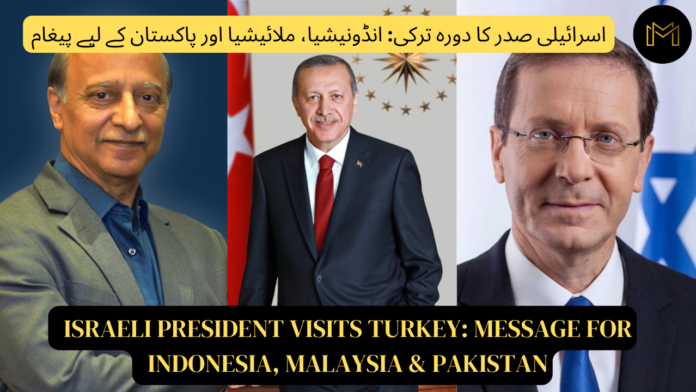“I believe that this historic visit will be a new turning point in the relations of Turkey and Israel ….. this visit is “an opportunity to develop our energy cooperation,” Erdogan said after his meeting with Israeli President Isaac Herzog on March 10.
The Israeli President Isaac Herzog also acknowledged the potential of Turkish-Israeli relations.
“Israel and Turkey can and should have a cooperation that can positively affect this entire region we call home …relations with Turkey will be based on mutual respect from now on,” said the Israeli President in what appeared to be a new diplomatic offensive aimed at winning back Turkey’s political partnership.
Herzog candidly admitted at Tel Aviv before embarking on the Turkey trip that both nations many not necessarily “agree on everything, and the relationship between Israel and Turkey has certainly known ups and downs and not-so-simple moments in recent years but we shall try to restart our relations and build them in a measured and cautious manner, and with mutual respect between our states,” he said.
A few points merit consideration to the context of ever expanding contacts of Israel as well as greater acceptance of India within some of the lead OIC countries (UAE, Saudi Arabia and Turkey).
Firstly, the Israeli government appears more confident following the establishment of ties with lead Gulf nations such as UAE, Bahrain and Qatar. It is now keen to reach out to Pakistan, Malaysia, Indonesia and Saudi Arabia.
Secondly, at state level, Turkey, Egypt, UAE, Bahrain and India have separated the issue of a totally independent Palestinian state and the expansion in Jewish settlements from their political and commercial relations with Israel.
Thirdly, most realignments seem to flow from concerns for economic security and connectivity. One area of interest betweenTurkey and Israel, for example is to carry Israeli natural gas to Europe, reviving an idea first discussed more than 20 years ago.
Clearly, even today Erdogan remains one of the most vocal supporters of the Palestinian cause but has chosen to deal with it independent of his country’s economic needs – discarding his emotive, nationalistic, pan-Islamist rhetoric after the shocks that the Turkish economy is currently suffering.
The thrust of the major Gulf countries’ tilt towards Israel also stems from economic considerations.
Fourth, the Egyptian President General Abdel Fattah El-Sissi also enjoys Israeli support. His presence has brought about considerable stability in government-to-government relations. In fact Israelis view Sissi as a man who has managed to fix much of the damage that his Islamist predecessor Mohammad Morsi had done to not only to the country’s socio-political architecture but also the relations with Israel.
General Sissi, whose portraits adore the streets and highways of Cairo and beyond, is credited with the new wave of infrastructure construction – rehabilitation , redesign and expansion – all over.
Capital Cairo’s redesign and new highways are set to service the new – under construction – capital on the congested city’s outskirts. This mega-project symbolizes President Sissi’s resolve to rebuilding the economy after years of political instability. The IMF loans that came through under him have helped the economy rebound after two harsh years under Covid-19.
Although very conscious of the public sentiment in most Muslim countries, Israeli officials’ messaging to their hardline critics is simple — we want to conduct relations independent of our ties with India and a few other countries which are benefitting immensely from the Israeli research in IT, agriculture and defence production.
This sounds all right but the bigger challenge is how do these countries navigate the loaded minefield of public sentiments against Israel? How do they deflect from the Palestinian narrative which views the Zionist state as an expansionist power that has systematically deprived Palestinians of their lands, how to address the issue of new Jewish settlements at the cost of Palestinian displacement.
We must bear in mind that much of the antagonism within OIC nations has indeed been anchored in the Palestinian narrative on Israel. Recognition by the UAE and Bahrain in 2021 has dented this collective OIC rejection of Israel. Turkey, UAE and Bahrain have nevertheless walked out of that silo, despite sticking to their core position on the issue of Palestine. Will other leading Muslim countries also follow suit, let us wait and see who blinks first.




